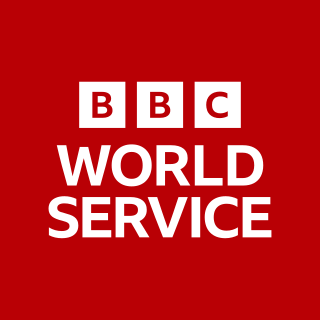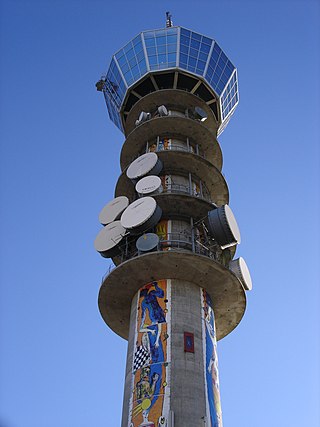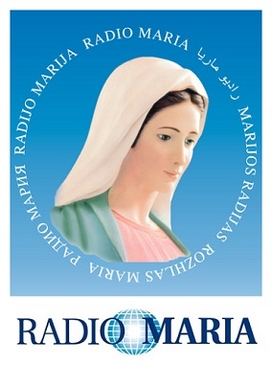
The BBC World Service is an international broadcaster owned and operated by the BBC. It is the world's largest external broadcaster in terms of reception area, language selection and audience reach. It broadcasts radio news, speech and discussions in more than 40 languages to many parts of the world on analogue and digital shortwave platforms, internet streaming, podcasting, satellite, DAB, FM, LW and MW relays. In 2024, the World Service reached an average of 450 million people a week. In November 2016, the BBC announced that it would start broadcasting in additional languages including Amharic and Igbo, in its biggest expansion since the 1940s.

Shortwave radio is radio transmission using radio frequencies in the shortwave bands (SW). There is no official definition of the band range, but it always includes all of the high frequency band (HF), which extends from 3 to 30 MHz. It lies between the medium frequency band (MF) and the bottom of the VHF band.
International broadcasting consists of radio and television transmissions that purposefully cross international boundaries, often with then intent of allowing expatriates to remain in touch with their countries of origin as well as educate, inform, and influence residents of foreign countries. Content can range from overt propaganda and counterpropaganda to cultural content to news reports that reflect the point of view and concerns of the originating country or that seek to provide alternative information to that otherwise available as well as promote tourism and trade. In the first half of the twentieth century, international broadcasting was used by colonial empires as a means of connecting colonies with the metropole. When operated by governments or entities close to a government, international broadcasting can be a form of soft power. Less frequently, international broadcasting has been undertaken for commercial purposes by private broadcasters.
Christian radio refers to Christian media radio formats that focus on Christian religious broadcasting or various forms of Christian music. Many such formats and programs include contemporary Christian music, gospel music, sermons, radio dramas, as well as news and talk shows covering popular culture, economics, and political topics from a Christian perspective.

Radio broadcasting is the broadcasting of audio (sound), sometimes with related metadata, by radio waves to radio receivers belonging to a public audience. In terrestrial radio broadcasting the radio waves are broadcast by a land-based radio station, while in satellite radio the radio waves are broadcast by a satellite in Earth orbit. To receive the content the listener must have a broadcast radio receiver (radio). Stations are often affiliated with a radio network that provides content in a common radio format, either in broadcast syndication or simulcast, or both. The encoding of a radio broadcast depends on whether it uses an analog or digital signal. Analog radio broadcasts use one of two types of radio wave modulation: amplitude modulation for AM radio, or frequency modulation for FM radio. Newer, digital radio stations transmit in several different digital audio standards, such as DAB, HD radio, or DRM.
Public broadcasting involves radio, television, and other electronic media outlets whose primary mission is public service. Public broadcasters receive funding from diverse sources including license fees, individual contributions, public financing, and commercial financing, and claim to avoid both political interference and commercial influence.

Deutsche Welle, commonly shortened to DW, is a German public, state-owned international broadcaster funded by the German federal tax budget. The service is available in 32 languages. DW's satellite television service consists of channels in English, Spanish, and Arabic. The work of DW is regulated by the Deutsche Welle Act, stating that content is intended to be independent of government influence. DW is a member of the European Broadcasting Union (EBU).
Radio Canada International (RCI) is the international broadcasting service of the Canadian Broadcasting Corporation (CBC). Prior to 1970, RCI was known as the CBC International Service. The broadcasting service was also previously referred to as the Voice of Canada, broadcasting on shortwave from powerful transmitters in Sackville, New Brunswick. "In its heyday", said Radio World magazine, "Radio Canada International was one of the world's most listened-to international shortwave broadcasters". However, as the result of an 80 percent budget cut, shortwave services were terminated in June 2012, and RCI became accessible exclusively via the Internet. It also reduced its services to five languages and ended production of its own news service.

Canadian Forces Radio and Television (CFRT), Radiotélévision des Forces canadiennes (RTFC) in French, was a television and radio network system broadcast by satellite to those members of the Canadian Forces ground forces who served overseas in places such as the Middle East, Africa and Europe and, due to popular demand, the service began broadcasting to His Majesty's Canadian Ships in April 2002. The network was not available domestically within Canada.
Vatican Radio is the official broadcasting service of Vatican City.
Shortwave broadcasting in the United States allows private ownership of commercial and non-commercial shortwave stations that are not relays of existing AM/MW or FM radio stations, as are common in Africa, Europe, Asia, Oceania except Australia and Latin America. In addition to private broadcasters, the United States also has government broadcasters and relay stations for international public broadcasters. Most privately owned shortwave stations have been religious broadcasters, either wholly owned and programmed by Roman Catholic and evangelical Protestant charities or offering brokered programming consisting primarily of religious broadcasters. To better reach other continents of the world, several stations are located in far-flung US territories. Shortwave stations in the US are not permitted to operate exclusively for a domestic audience; they are subject to antenna and power requirements to reach an international audience.
Religious broadcasting, sometimes referred to as faith-based broadcasts, is the dissemination of television and/or radio content that intentionally has religious ideas, religious experience, or religious practice as its core focus. In some countries, religious broadcasting developed primarily within the context of public service provision, whilst in others, it has been driven more by religious organisations themselves. Across Europe and in the US and Canada, religious broadcasting began in the earliest days of radio, usually with the transmission of religious worship, preaching or "talks". Over time, formats evolved to include a broad range of styles and approaches, including radio and television drama, documentary, and chat show formats, as well as more traditional devotional content. Today, many religious organizations record sermons and lectures, and have moved into distributing content on their own web-based IP channels.
International religious television broadcasters broadcast from a host nation to another nation or nations. Such operations are mostly operated from the United States of America, Portugal and Italy, in conjunction with a religious organization having links to many churches or shrines who produce their own programs. The following is a list of such broadcasters with links to entries about each one:

Radio Taiwan International is the English name and call sign of the Central Broadcasting System (CBS), national broadcaster and international radio service of Taiwan. It is a government-owned station that broadcasts in 14 languages around the world via the internet, shortwave and podcasts. It also has Facebook fan pages in five additional languages.

Voice of Korea is the international broadcasting service of North Korea. It broadcasts primarily information in Chinese, Spanish, German, English, French, Russian, Japanese and Arabic. Until 2002 it was known as Radio Pyongyang. The interval signal is identical to that of Korean Central Television.
The Three Angels Broadcasting Network (3ABN) is a Christian media television and radio network which broadcasts Seventh-day Adventist religious, music and health-oriented programming, based in West Frankfort, Illinois, United States. Although it is not formally tied to any particular church or denomination, much of its programming focuses on Seventh-day Adventist theology and Adventist doctrine.
Radio Sweden is Sweden's official international broadcasting station. It is a non-commercial and politically independent public service broadcasting company.
DWVN-DTV, is a digital television station of Gateway UHF Television Broadcasting. Its studios are located at North Philippines Union Conference Compound, #210 San Juan St., Pasay, while its transmitter is located at GSat Technical Facilities and Earth Station Building, First Global Technopark Complex, Lot 1910 Governor's Drive, Barangay Ulong Tubig, Carmona, Cavite.

Radio Maria, formally known as The World Family of Radio Maria, is an international Catholic radio broadcasting service founded in Erba, province of Como, in the diocese of Milan, Italy, in 1987.
United Nations Radio was created on 13 February 1946. In 2017, United Nations Radio and the UN News Centre merged to form UN News, producing daily news and multimedia content in Arabic, Chinese, English, French, Swahili, Portuguese, Russian, Spanish, and Hindi. In its new iteration, UN News Audio continues to produce daily news and feature stories about the work of the UN and its member countries in eight languages for more than 2,000 partner radio stations around the world.







